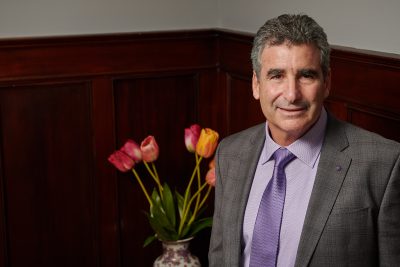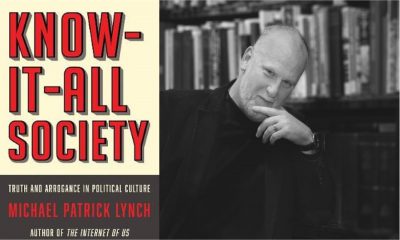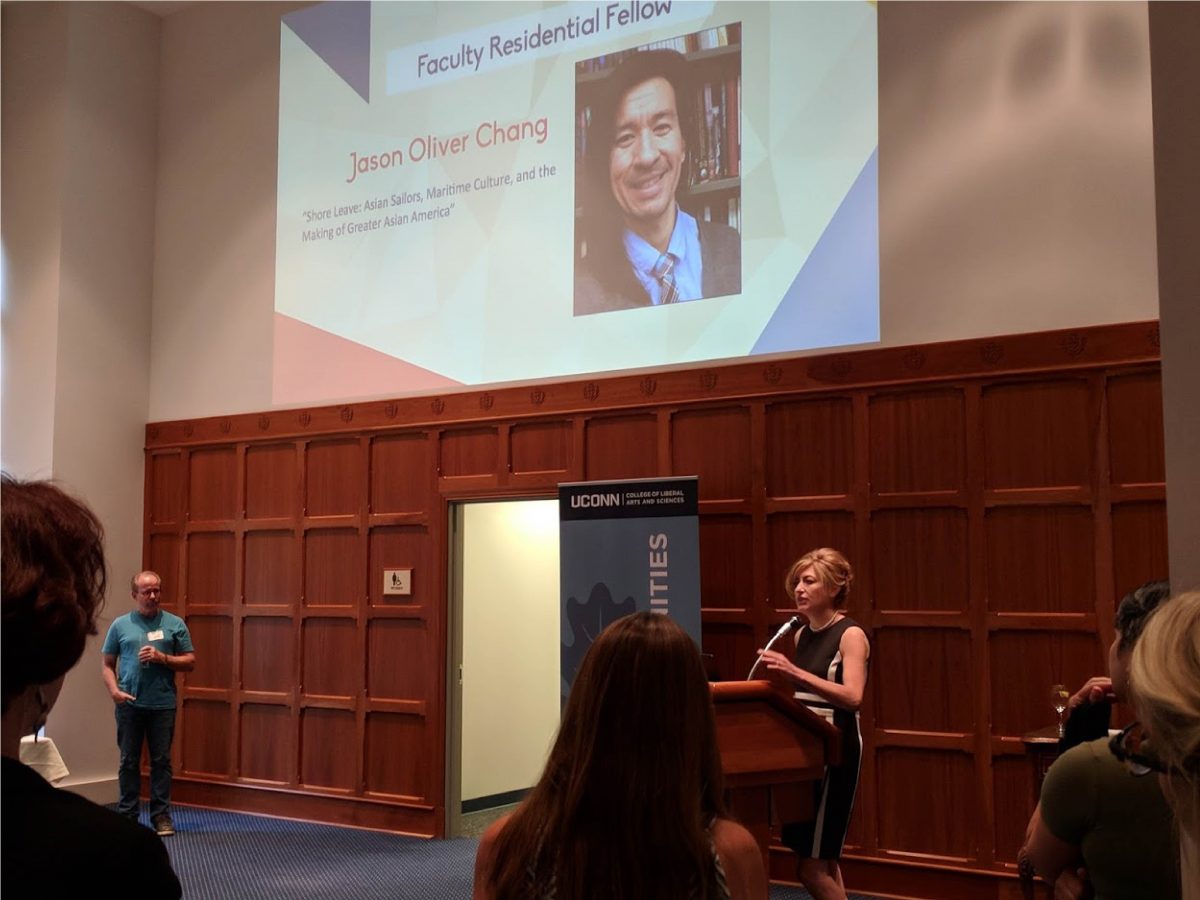The University of Connecticut Humanities Institute (UConn-UCHI) director Michael Lynch has a new book: “Know-It-All Society: Truth and Arrogance in Political Culture.” Michael’s book, published by Liveright Publishing, explores how social media, despite what we may think, is used not for disseminating knowledge and facts, but as a means of expressing our outrage at those who do not share our convictions. This has only served to fan the flames of our public divide and tribal political affiliations: white nationalism and authoritarianism to the right, and identity politics and arrogant liberalism to the left. What’s the solution? Perhaps a dose of humility. Michael is the Board of Trustees Distinguished Professor of philosophy at UConn. He also served as the Principle Investigator of UCHI’s Humility and Conviction in Public Life Project (HCPL) funded by UConn and The Templeton Foundation.
Humility and Conviction
President Herbst’s Legacy Heralds a Bright Future for UCHI
As the larger UConn community says farewell to President Susan Herbst, who served as its 15th president from 2011 to 2019, we at the University of Connecticut Humanities Institute (UCHI) would like to add to the chorus of well-wishers. President Herbst was an advocate for the humanities and arts on campus, which is exemplified by her initiative to establish the Susan Herbst and Douglas Hughes Family Scholarship in the Humanities, awarded annually to incoming undergraduate students in the College of Liberal Arts and Sciences who show academic achievement and financial need. UCHI was honored to be a part of Herbst’s commitment to building a stronger core of humanities scholarship and outreach at UConn. Evidence of this commitment can be seen in the remarkable grow and productivity of UCHI since 2011. Some of the key accomplishments of UCHI under the Herbst administration include:
The Humility and Conviction in Public Life initiative from 2015 to 2019, which was funded by UConn and a $6,000,000 grant from the John Templeton Foundation. HCLP engaged in multiple research projects, educational opportunities, and regional outreach programs with the goal of promoting intellectual humility and investigating how humility promotes more constructive and meaningful public dialogues. HCPL also supported several residential fellowships and funded 22 cross-disciplinary projects at UConn and from around the world, all with the aim of exploring the meaning of public discourse and developing strategies to encourage better-informed public debates.
The New England Humanities Consortium, which was established in 2018 with the support of a $100,000 grant from the Andrew W. Mellon Foundation, promotes collaborative research, intellectual exchange, and educational programing for faculty and students at 11 schools in New England. UCHI serves as the executive hub of NEHC, which along with sponsoring numerous cross-campus events, funding research, supporting the public humanities in the region, has supported the Faculty of Color Working Group, an innovative group seeking to encourage and nurture diversity in New England.
The Digital Humanities and Media Studies initiative, which since 2016 has been bringing UConn faculty and students in the humanities and media studies together in a unique interdisciplinary environment. DHMS supports a plethora of projects, including research into the history of Hartford and Connecticut, and various online resources such as the African Film Database.
Increased funding for faculty and graduate research fellowships. Year-long residential fellowships provide scholars with the opportunity to pursue advanced work in the arts and humanities. Since 2011 generous funding from UConn has supported 40 dissertation fellowships for UConn graduate students, over 50 fellowships for UConn faculty from multiple departments and disciplines, and over 30 visiting fellowships for scholars from 26 different institutions from around the world.

During Herbst’s tenure, UCHI emerged as a leading hub of collaborative scholarship at the regional, national, and international stage. Dr. Herbst’s commitment to the humanities and UCHI’s success is echoed in incoming president Thomas Katsouleas’ belief in the importance of the humanities to addressing “societal grand challenges.” We join the greater UConn community to thank President Herbst and wish her the best as she returns to academia, and we look forward to the start of a new chapter at the Humanities Institute.
Photo Credit: Nasya Al-Saidy (Top) and Peter Morenus/UConn Photo (Bottom)
We are pleased to announce that The John Templeton Foundation has awarded $5.75 million to the UConn Humanities Institute for research on balancing humility and conviction in public life.
The John Templeton Foundation has awarded $5.75 million to the UConn Humanities Institute for research on balancing humility and conviction in public life.
The grant is the largest for the humanities ever awarded to UConn, and is one of the largest humanities-based research grants ever awarded in the United States.
Michael P. Lynch, the project’s principal investigator, says examining the role that traits such as humility and open-mindedness can play in meaningful public discourse could promote healthier and more constructive discussion about various divisive issues in religion, science, and politics.
“As this presidential campaign is constantly reminding us, real political dialogue — and any sense of intellectual humility — seems to have gone missing in American politics. But we can’t just blame that on politicians or those on the other side of the aisle; we need to look at what it is about culture, psychology, and the human condition that has led us to this point,” says Lynch, a professor of philosophy and director of the Humanities Institute. “We want to know the underlying causes of our dramatic breakdown in open dialogue and how to fix it.”
Lynch says the grant will provide an unprecedented integration of research from the humanities and sciences, as well as extending and applying research developed by previous projects on intellectual humility and related concepts funded by Templeton.
We want to know the underlying causes of our dramatic breakdown in open dialogue and how to fix it.
“There has been significant work done in recent years on the role that bias and dogma play in how we evaluate each other. And there are lots of people working to bring meaningful dialogue to communities,” he adds. “But rarely do these two groups meet. This project brings together our most creative and visionary thinkers with democracy practitioners to look at the real problems people face when talking to those with different religious and political worldviews other than their own.”
The grant will allow the Humanities Institute, which is part of the College of Liberal Arts and Sciences, to sponsor three high-profile public forums; summer institutes for high school teachers on how to incorporate intellectual humility into their classes; an online course on project themes; and a series of awareness-raising media initiatives. The co-principal investigator for the project is Brendan Kane, an associate professor of history and associate director of the Humanities Institute.
The project’s research activities include a visiting fellowship program hosting leaders from the academic, media, and non-profit sectors; an international research funding competition targeting interdisciplinary teams of researchers pursuing project themes; four research workshops hosted at UConn; and a collaboration with UConn’s Mellon Foundation-funded “Scholarly Communications Design Studio” for the presentation of project research in new interactive modalities.
The Humanities Institute has a history of sponsoring both public engagement and interdisciplinary research, and will bring together specialized resources for research in the social sciences and humanities for the purpose of elevating the tone and outcomes of public discourse in American society.



